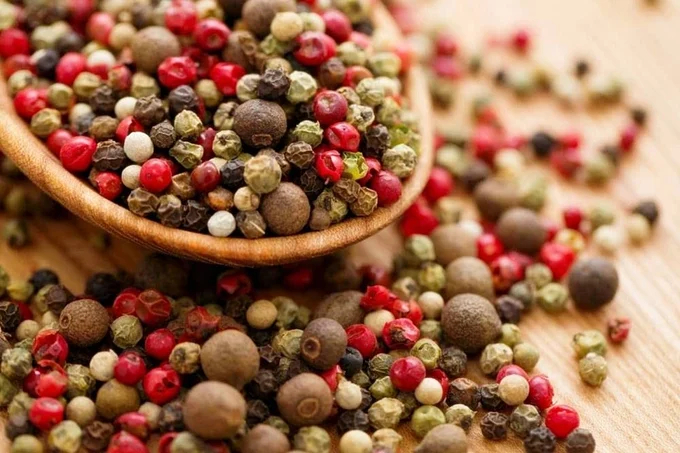November 25, 2025 | 18:34 GMT +7
November 25, 2025 | 18:34 GMT +7
Hotline: 0913.378.918
November 25, 2025 | 18:34 GMT +7
Hotline: 0913.378.918

Update on domestic and international pepper prices 08/07/2024
Globally, the pepper market on August 7 saw mixed movements.
Accordingly, the price of black pepper from Lampung in Indonesia increased by 0.49% to $ 7,21/ton. The price of white pepper from Muntok in the same country also rose slightly by 0.49% to $ 8,836/ton.
The price of Kuching ASTA black pepper in Malaysia remained at $ 8,500/ton, while the ASTA white pepper from this country is priced at $ 10,400/ton.
In the Brazilian market, the price of ASTA 570 black pepper fell by 5.47%, trading at $ 6,400/ton.
In Vietnam, the export price of black pepper of 500 g/l is traded at $ 6,000/ton, while the 550 g/l type is priced at $ 6,600/ton. The price of white pepper for export remains at $ 8,800/ton.
The global pepper market today shows mixed movements, with slight increases in Indonesia but significant drops in Brazilian black pepper and stability in other markets.
The global pepper supply has been supplemented as Indonesia entered its harvest season, which started in July. However, Brazil, the second-largest black pepper producer in the world, is facing continuous crop failures due to drought.
Thus, global pepper prices on 08/07/2024, experienced mixed changes compared to yesterday.
In the domestic market, the pepper market on August 7 continued to decline sharply compared to yesterday.
Specifically, Dak Lak decreased by VND 3,000, purchasing pepper at VND 139,000/kg;
The price of pepper in Dak Nong today fell to VND 139,000/kg, down VND 2,000;
The price of pepper in Gia Lai today decreased by VND 1,000, trading down to VND 139,000=/kg;
Traders in Dong Nai purchased pepper at VND 138,000/kg, down VND 3,000;
Similarly, the price of pepper in Ba Ria - Vung Tau today dropped to VND 138,000/kg;
Meanwhile, Binh Phuoc saw a decrease of VND 4,000, trading pepper down to VND 137,000/kg.
Domestic pepper prices today fell sharply by an additional VND 1,000 - 4,000, bringing this agricultural product down to around VND 139,000/kg.
According to the Vietnam Pepper Association (VPSA), in the first six months of the year, Vietnam's pepper exports to China decreased while other markets saw a significant increase by two to three digits.
Specifically, China dropped from the number one position to the fifth position on the list of Vietnam's largest pepper export markets, with a volume of 7,451 tons and a value of $ 20 million, a sharp decrease of 85.2% in volume and 81.7% in value compared to the same period last year. China's market share also shrank to 5.2% from 33% in the same period last year.
VPSA stated that in 2024, the lower-than-expected economic growth, tightened consumer spending, and sufficient inventory levels are some of the reasons why China continues to limit pepper purchases from Vietnam.
Furthermore, the increase in domestic pepper prices did not meet expectations due to low demand from the Chinese market. Currently, pepper prices in the Chinese market are lower than those in Vietnam, which could be the main reason for the restriction on pepper imports from Vietnam.
According to Chinese Customs data, Vietnam was the second-largest supplier of pepper to China (after Indonesia) in the first half of this year with 1,515 tons, down 7.6% from the same period last year. Meanwhile, Vietnam's market share in China was 32.7%, down from 36.5% in the same period last year.
The average import price of pepper into the Chinese market in June was over $ 4,400/ton, up 22% from the same period last year but down 7.4% from May.
Thus, domestic pepper prices on 08/07/2024, are trading around VND 137,000 - 139,000/kg.
$ 1 = VND 24.965 - Source: Vietcombank.
Translated by Hoang Duy
/2025/11/24/3616-2-141832_513.jpg)
(VAN) FSC certification has helped increase the value of thousands of hectares of planted forest timber under the management of the Xuan Loc Protection Forest Management Board, particularly in terms of selling prices.

(VAN) More than 100 shoppers queued for a chance to get a kilo or so of Japanese rice for 500 yen ($3.32) by heaping as much grain into a small wooden box as possible.

(VAN) Benchmark international prices of milled declined in October as harvests started or improved in some parts of the globe.

(VAN) Show cause orders will be issued to retailers who sell imported rice at prices exceeding the maximum suggested retail price (MSRP) of P43 per kilo, Philippines Agriculture Secretary said in a statement on Thursday.

(VAN) Coffee prices on October 20, 2025, remained stable domestically, trading at 113,500–114,500 VND/kg. Similarly, global coffee prices also moved sideways.

(VAN) By October, Vietnam’s coffee exports had surpassed USD 7 billion for the first time and will exceed USD 8 billion within this year.

(VAN) Illinois rancher says Texas, Oklahoma, Kansas lost grass and forage, forcing massive cattle liquidation.